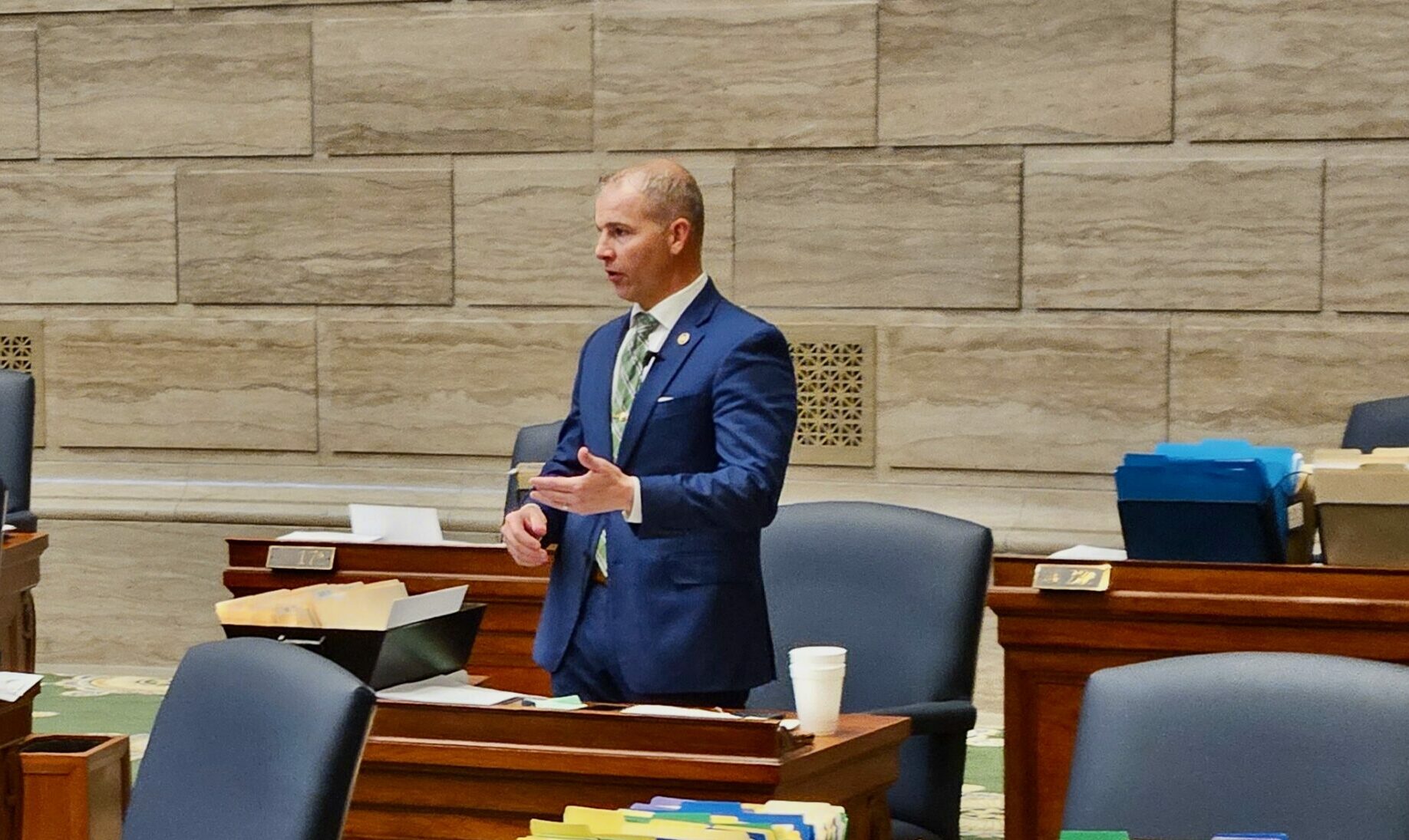Freedom Caucus ends filibuster in Missouri Senate without action on its demands

JEFFERSON CITY, Mo. — None of the demands Missouri Freedom Caucus members said must be met before they would drop a filibuster against legislation renewing taxes that fund Medicaid were achieved when the group decided to end its resistance a little before 3:30 a.m. Thursday.
After a 41-hour-filibuster, the Senate gave initial approval Thursday morning to a bill renewing taxes on hospitals, pharmacies, nursing homes and ambulance services that are essential to Missouri’s Medicaid program. The bill must be approved by the Senate one more time before it heads to the House.
And other than the addition of a 2029 expiration date for the taxes, none of the things that were at the heart of the Freedom Caucus filibuster were accomplished.
One demand, a final Senate vote on a proposal to change how the majority is determined on future constitutional amendments, can’t happen until at least Monday because the Senate won’t return until then.
The other, Gov. Mike Parson’s signature on a bill banning Planned Parenthood from receiving Medicaid payments for covered medical services, will happen on the governor’s timeline — and he didn’t seem eager to give the caucus a victory earlier in the week.

In an interview after the Senate adjourned, state Sen. Lincoln Hough, chairman of the Senate Appropriations Committee and sponsor of the provider tax renewal, said the end was a complete defeat for Freedom Caucus members.
“What you saw today was the majority of the majority party all sticking together saying we know we have a duty to govern in this state, and we’re going to do whatever we need to do that,” Hough said.
The filibuster did set a record of sorts for the longest attempt to block a single bill, but because some of the time was spent on procedural motions, Democrats challenge whether their record has actually been broken.
Five Freedom Caucus members kicked off a filibuster shortly after the Senate session began Tuesday, determined to monkeywrench the machinery on a bill renewing taxes known as the federal reimbursement allowance.
The five Republicans – Sens. Rick Brattin, Bill Eigel, Denny Hoskins, Andrew Koenig and Nick Schroer – took turns holding the floor, adhering to the Senate rule that they only speak once on a motion and turning routine motions into tests of endurance.
On the Senate floor, the filibuster played out in bursts of euphoric declarations by caucus members interspersed with hours of each reading books, often with a religious theme.
During a shift Wednesday, Eigel, a Weldon Spring Republican running for governor, claimed the filibuster would be the longest in Senate history and would set the record at midnight. When Senate Democrats told him that a recess of 15 minutes, plus eight hours on procedural motions, would be subtracted, he took good-natured offense.
“Here we are at the cusp of greatness,” Eigel said, “and now I have other members of this chamber trying to take it away from us.”
But outside the chamber it was all-out warfare on social media.
On Wednesday, Majority Floor Leader Cindy O’Laughlin used her Facebook account to claim that everything the Senate had accomplished as Republican priorities had been done in spite of obstruction of the Freedom Caucus.
The filibuster threatened Medicaid funding for essential services, she wrote.
“Now, our hospitals, nursing homes, and state budget are in jeopardy due to outside lobbyists and dark money working against Missourians through a small faction of our own Senate,” O’Laughlin wrote.
She posted the office telephone numbers of the five in the filibuster and asked constituents to call.
At 10:10 p.m. Wednesday, about the time he left a shift on the Senate floor, Eigel struck back through his social media.
In a statement from his campaign, Eigel blamed O’Laughlin and Senate President Pro Tem Caleb Rowden for forcing him to filibuster to achieve Republican objectives.
The Freedom Caucus is filibustering, the statement read, “because the Senate leadership and the RINO Brigade, once again, will do everything possible to avoid getting conservative policies across the finish line.”
Eigel did not respond to a text message asking for comment on the end of the filibuster.
Budget deadline looms
The filibuster successfully stalled action on the budget this week.
With the Senate not returning until Monday, there will be only four days left to pass the budget and iron out differences with the House before the May 10 deadline.
The filibuster greatly increased the chances lawmakers will finish a state budget in a special session, House Budget Committee Chairman Cody Smith said.
In an interview Wednesday afternoon with The Independent, Smith said he and House staff were combing through the $53 billion spending plan adopted last week by the Senate Appropriations Committee. He hasn’t seen anything that would cause an impasse, he said, but he’s still learning about every change to the $50.8 billion budget proposal passed in the House.
The most pressing problem, Smith said, is having enough time to do the job.
“I’m concerned that the Senate will be unable to move through their appropriations process within a time to get us to conference between the House and Senate or maybe even if they won’t be able to pass a budget at all, within the regular session,” Smith said.
The amount of work to prepare for budget conference committees and to get the results into the form of bills lawmakers can consider is enormous. To make the deadline, Smith said, conference committee talks must conclude by next Wednesday.

Under House rules, substitute bills must be on the calendar for a day before they come to a vote. Wednesday decisions would result in final votes in both chambers on May 10.
“We need to let staff finalize the conference committee reports and that takes some time,” Smith said.
There are ways to shorten the time needed to finish the budget, Hough said. He has been talking with Smith, GOP leadership in both chambers and Democrats. Substitute bills have been prepared for debate as of Monday, he said.
“I think tonight, this morning, was a very good step to explain to people that we’re not going to be held hostage for somebody else’s political game,” Hough said.
The Freedom Caucus members have promised a line-by-line examination of the budget. Hough said he is prepared for that. He will answer honest questions, he said, but he doesn’t think Eigel is honest.
“I have no problem going through this.” Hough said. ”The problem I have is when people are disingenuous about what they’re saying, and Bill Eigel routinely is just borderline lying about things. He either doesn’t understand it, or you know, or he just wants to sensationalize things.”
Under a constitutional provision adopted in 1988, lawmakers are required to finish work on appropriation bills one week before the end of their annual session. Lawmakers have failed to meet that deadline only once, in 1997.
That year, two spending bills weren’t passed in time.
This year, there are 17 spending bills stacked up on the Senate calendar, including one to keep programs short of funds operating through the end of the current fiscal year.
As it was in 1997, the central issue is abortion.
Then, the question was how to make Planned Parenthood prove it wasn’t subsidizing clinic administration or abortion services with state-paid family planning services.
This time, it is Republicans desperate to avoid a November vote on whether abortion should remain illegal in Missouri. An initiative petition campaign to put abortion rights on the ballot is expected to turn in signatures any day to the Secretary of State’s office to be placed on the statewide ballot.
Value of the reimbursement allowance
The bill that was the focus of this week’s filibuster is a key source of money for Missouri’s Medicaid program.
Levied on all hospitals, nursing homes, ambulance services and pharmacies, the approximately $1.4 billion raised by the taxes draws $2.8 billion in federal matching funds. For most Medicaid programs, Missouri pays about 35% of the cost and the federal government picks up the rest.
The Medicaid program in Missouri cost $16.1 billion in the fiscal year that ended June 30. Parson asked for $17.8 billion for the program for the coming year in his budget proposal.
The taxes, called the federal reimbursement allowance, helped keep the general revenue cost of Medicaid to $3 billion, or about 19% of the total.
Hough, a Springfield Republican running for lieutenant governor, wanted the bill passed without anything but a change to the expiration date of the taxes, currently set for Sept. 30.
The bill he filed eliminated the sunset date but the bill he brought to the floor sets a five-year expiration. Since being enacted in 1991, the taxes have been renewed 17 times, 16 with little or no controversy. Only the most recent renewal, in 2021, became entwined with the abortion issue during the regular session.
Parson called lawmakers back and they renewed the taxes with just hours to spare before the new state fiscal year began.
Big differences
Even with the provider taxes secured, ironing out a final budget from the House and Senate positions will take time. The budget passed by the House spends $2.2 billion less than the proposal awaiting Senate debate.
The $50.8 billion total includes $14.9 billion in general revenue, with $14.1 billion in the operating budget. The Senate committee proposal is $53 billion, with $15.7 billion in general revenue including $14.9 billion in the operating budget.
Funding either budget, or Parson’s original $52.7 billion plan, requires tapping the state’s massive surplus, which stood Tuesday at about $6.4 billion in general revenue and other funds.
His goal for the budget, Smith said, is to keep general revenue spending for ongoing state needs within the anticipated revenue for the coming year. He defines a balanced budget as one with general revenue spending for ongoing programs like public schools, Medicaid and other services at or below annual revenue.
“All those expenses are ongoing and they need to fit within our ongoing revenues,” Smith said.
The official estimate for the coming fiscal year is $13.1 billion but sustained growth at the year-to-date rate through late April means it could be $13.5 billion. There are numerous one-year general revenue spending items in the operating budget for the coming year, including $373 million for improvements on Interstate 44.
Surplus money is for investing in the state, Smith said.
“You treat those surpluses,” he said, “as more one-time funding.”
Miss Clipping Out Stories to Save for Later?
Click the Purchase Story button below to order a print of this story. We will print it for you on matte photo paper to keep forever.

